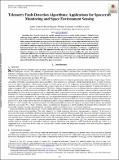Telemetry Fault-Detection Algorithms: Applications for Spacecraft Monitoring and Space Environment Sensing
Author(s)
Carlton, Ashley; Morgan, Rachel; Lohmeyer, Whitney; Cahoy, Kerri
DownloadMain article (1.500Mb)
Metadata
Show full item recordAbstract
Algorithms have been developed that identify unusual behavior in satellite health telemetry. Telemetry from solid-state power amplifiers and amplifier thermistors from 32 geostationary Earth orbit communications satellites from 1991 to 2015 are examined. Transient event detection and change-point event detection techniques that use a sliding window-based median are used, statistically evaluating the telemetry stream compared to the local norm. This approach allows application of the algorithms to any spacecraft platform because there is no reliance in the algorithms on satellite- or component-specific parameters, and it does not require a priori knowledge about the data distribution. Individual telemetry data streams are analyzed with the event detection algorithms, resulting in a compiled list of unusual events for each satellite. This approach identifies up to six events of up to six events that affect 51 of 53 telemetry streams at once, indicative of a spacecraft system-level event. In two satellites, the same top event date (4 December 2008) occurs over more than 10 years of telemetry from both satellites. Of the five spacecraft with known maneuvers, the algorithms identify the maneuvers in all cases. Event dates are compared to known operational activities, space weather events, and available anomaly lists to assess the use of event detection algorithms for spacecraft monitoring and sensing of the space environment.